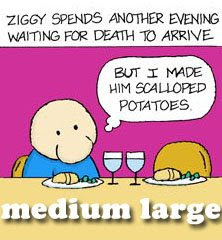Now, I know some of you may be tiring of these constant updates about the current position of my webcomic Medium Large on The 2008 Weblog Awards Best Comic Strip Poll (where you can vote every 24 hours through January 13th and where my strip is tentatively in third place). I know such polls are, in the grand scheme of things, often silly and exercises in self-congratulation. I know the point of doing a webcomic is the actual pleasure of creating said strip, not requiring external accolades and affirmations. I know so many things. And you know why I know?
Constant personal edification. Even at the ripe old age of 41 I still recognize how crucial it is never to stop learning, never to stop feeding one's brain--one's very soul--with more and more information and the understanding of others. To deny ourselves new knowledge, new counsel, is to deny our very lives their purpose. For it's not the "meaning" of life we are truly after in the end but the very experience of being alive, to know that we truly have lived, and part of doing such is to be open to all possibilities and potential, whether through our own actions or those of others.
So in that very spirit of self-exploration and intellectual expedition I decided to do something new and read several books from a branch of thought I have thus far denied myself--business management. To be quite honest, I fully expected to glean little of personal value from such an endeavor but lo, how wrong I was. And thus, to help those like myself who are always on the lookout for new academic and analytical horizons, I have compiled summaries of the five business books I read during the holiday rerun period on TV. Read, revel and reawaken your senses to what may be.
Just Because You Wish Thorn Bushes Tasted like Double Chocolate Swirl Ice Cream Doesn’t Mean You Should Go Right Out and Lacerate Your Mouth in a Thicket: A Business Fable
From the best-selling author of If Wishes Were Candy We’d All Be Buried Under Six Tons of Zagnuts comes this instructive guide about going from a career dreamer to a professional doer. The book opens—as many a business tome does—with a parable, this time about a snowman that more than anything else wants to be a polar bear. With a Fender guitar. And a trophy wife. He wishes and wishes but no matter how hard he hopes his dreams always come to naught. Then one day a penguin drives up in a golf cart and says in a comical French accent, "Stupid snowman. You can never be a polar bear. Your body structure is all wrong. Plus bears have strict unions. Instead, you should concentrate on being the best snowman ever." The snowman mulls this over for a second and then replies, "You’re right! I’m going to be the best snowman ever." Six months later he has controlling interest in U.S. Steel.
While the book includes much in the way of useful information, the reader is eventually left with more questions then answers. Why does the imagery of the parable in no way correspond to that of the book’s title? How exactly does a snowman assume leadership of one of the world’s largest business concerns? Why does the penguin suddenly reappear in the final chapter only to rail against the Scots and the Trilateral Commission? In the end, though, these are minor quibbles compared to the wisdom you are certain to gain about flightless waterfowl and the rich inner lives of inanimate objects.
Hunter S. Thompson on Leadership
Keeping in spirit with the late, self-proclaimed "gonzo" journalist’s decisive moves and distinctive style, this short, direct work will teach executives wholly unexpected approaches for results-oriented management. Less an actual book than a compilation of quotes he woke up to find he had written on the walls and roof of his house, it’s sure to appeal to professionals who don’t want to think outside the box so much as shoot at it with an unlicensed howitzer while under the influence of home-cooked mescaline (as clearly demonstrated in the author’s photo). From the opening chapter "Look What Those Fucking Raccoons Did to My Youth I’m Going to Poison the Water Commissioner" to the closing summary "Oh Jesus I Can’t Feel My Thoughts I Want a Quesadilla Why Won’t the Key Start the Coat Rack," readers are sure to glean crucial insights into setting goals, establishing clear priorities, resolving personnel conflicts and just how to start building a submarine in your basement only to get distracted and instead try to construct a language consisting only of vowels. The book also contains what might be a recipe for beef stew, directions to some friend’s party and 122 pages about how to use dynamite in lieu of a fishing rod or swimming pool contractor.
The 247,000 Attributes of an Effective Business Leader
"Charisma." "Confidence." "Passion." "Selflessness." "Responsibility." "Vision." "Goals." "Initiative." "Analysis." "Instruction." "Teamwork." "Guidance." "Directness." "Loyalty." "Motivation." "Productivity." "Praising." "Discernment." The list goes on and one for more than 700 pages with nary an introduction, illustration or summation. While the author’s insistence on breaking up each term by syllable, the dearth of any context save proper grammatical usage and the inexplicable presence of such words as "heliotrope," "nursemaid" and "pulchritude" may lead one to assume the publisher simply slapped a new cover over an old copy of Webster’s Collegiate Dictionary, the tome is nonetheless an invaluable addition to any business professional’s library. Be sure to check out the highly informative appendices, including "Geographical Names," "A Chronology of Major Historical Events" and "A Guide to Pronunciation Symbols."
You Can’t Spell "Cannot" without "Can": Making the Impossible Unimpossiblish
If good management is the execution of a plan that meets or exceeds department goals then clearly great management is the execution of a plan that defies all reasonable or even logical expectations. To prove their point the authors randomly brought together a paleontologist, an unemployed bass player and the touring company of "Godspell" to lead a small South Pacific island to prosperity and international prominence. Six weeks later everyone was dead save a lone monkey with a note taped to his chest that read "Our new leader." While most people would look at the swath of needless destruction, the innumerable corpses and a logbook that includes the passage "Every day the monkey doubles our productivity quotas" as sure signs of absolute management failure, the authors (whose previous publishing credits include the investment guide Just Keep Thinking Happy Thoughts and Maybe Your Stocks Will Bounce Back) focus only on the positive. The country never had time to go into debt. No one achieved success at the expense of another team member. Everyone worked together to construct a large kite in hopes of flying off the island (albeit only to float into an active volcano). By concentrating on what was accomplished and completely ignoring all that went horribly, horribly awry, the authors illustrate a defining principle of most business leaders—to maintain a strong "vision" for your department it’s perfectly acceptable to ignore all the blind spots along the way.
Oh, God, We’re Fucked: How Change Will Be the Death of Us All
Written as a harsh rebuttal to the hugely successful and encouraging leadership bible Who Moved My Cheese?, this hastily scrawled and stapled tome starts with the premise that change can have nothing but a detrimental effect on one’s professional and personal life. Things proceed to get only darker from there as the author recounts a lifetime of setbacks, personal failures and opportunities that proved to be anything but. Eventually he forgoes prose all together to doodle stick figures in a hangman’s noose, paste pictures of his ex-girlfriend taken with a telephoto lens and scribble an extensive "enemies list" that includes several thousand names, many of them Muppets. Poorly mimeographed, published through a vanity press that shares an address with an SRO hotel and available only at check-cashing locations, the book is a desperate, utterly despairing cry for help. But at less than 40 pages—many of those torn out by the author himself—it can easily be read on your commute to work and the staggeringly obscene book jacket art alone is well worth your two bucks.
Subscribe to:
Post Comments (Atom)







10 comments:
"Constant personal edification"? That's definitely oversharing.
A couple of comments:
The correct punchline to the polar bear joke is "No soap, radio."
You forgot to credit the original author of The 247,000 Attributes..., Mark Roget.
And finally, what is the default browser width needed to see your full header (which is very nice btw), 2048 pixels? Perhaps you have some tech-savvy buddy that can make it span the sidebar, because that's beyond my meager CSS skilz.
Unfortunately Blogger doesn't seem to have a set width for the banner, like wordpress. If someone has any advice on how to fix that I would greatly appreciate it (and I'm happy you like the illustration, yellojkt!)
In the same spirit, you can check out this Amazon Review :
http://www.amazon.com/review/R2X2TB3S4O5I60
Okay, new template design. Hope that helps.
LOVE the new header!
Okay. It's time to write the book. Should be easy, just compile these essays. This one is one of your home-runs, and will anchor the book.
You're David Sedaris with an ability to make comics happen. Put it all together into a book. I'm pre-ordering from Amazon.com now.
Looks great, less filling.
I want that Hunter S. Thompson book. I do. Does it come with drugs, or do you have to supply your own?
Mintzworks is SO RIGHT!!!!!
Post a Comment